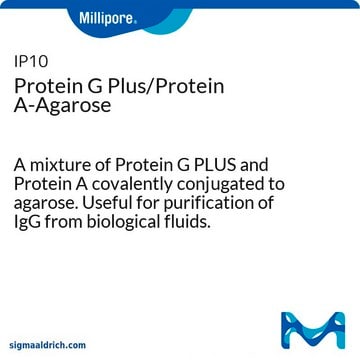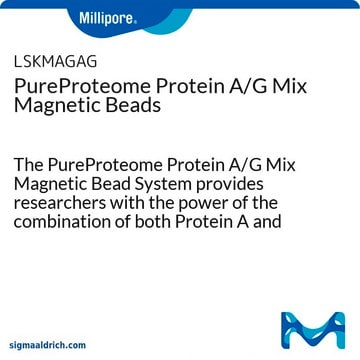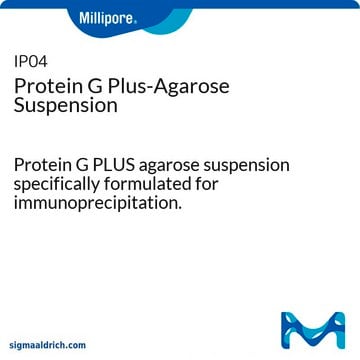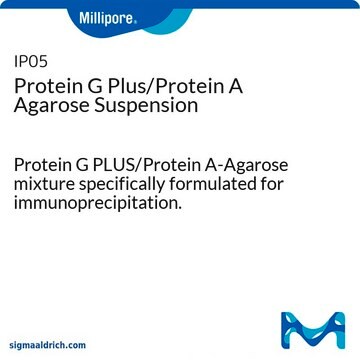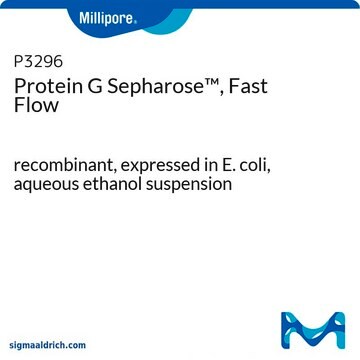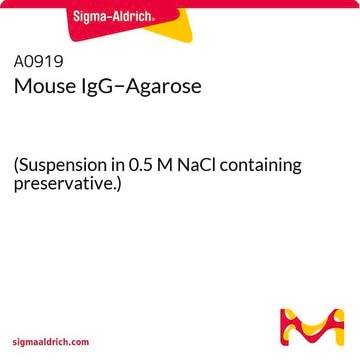11719386001
Roche
Immunoprecipitation Kit (Protein G)
sufficient for 20 reactions, kit of 1, suitable for immunoprecipitation (IP)
Synonym(s):
Protein G, immunoprecipitation kit
Sign Into View Organizational & Contract Pricing
All Photos(1)
About This Item
UNSPSC Code:
12352200
Recommended Products
usage
sufficient for 20 reactions
packaging
kit of 1
manufacturer/tradename
Roche
technique(s)
immunoprecipitation (IP): suitable
shipped in
wet ice
storage temp.
2-8°C
General description
Kit contains all reagents necessary for cell lysis, solubilization, stabilization, and immunopurification of proteins.
Specificity
Protein G is a cell wall protein, isolated from a specific bacterial strain, which has specific binding sites for certain classes of immunoglobulins from different species. Protein G binds nearly all subclasses of IgG, but no other classes of immunoglobulins.
Application
The immunoprecipitation kit has been used for the immunoprecipitation of proteins from cellular extracts with Protein G Agarose.
Packaging
1 kit containing 5 components.
Preparation Note
Working solution: Lysis buffer/wash buffer 1
The kit contains reagents for 125 ml of lysis buffer/wash buffer 1. Prepare at least a minimal volume of 25 ml, sufficient for four immunoprecipitations.
To prepare 25 ml of lysis buffer/wash buffer 1 mix 5 ml core buffer, 3.75 ml NaCl, 2.5 ml detergent mix and 1 cOmplete Tablet. Add water to a final volume of 25 ml.
Solution is stable at 2 to 8 °C for 24 hours. When stored in aliquots at -15 to -25 °C, the solution is stable for at least four weeks. Mix thoroughly after thawing.
Wash buffer 2
The kit contains reagents for 50 ml of wash buffer 2. 2 ml of this buffer is required for one immunoprecipitation.
To prepare 50 ml of wash buffer 2 mix 10 ml core buffer, 25 ml NaCl and 0.5 ml detergent mix. Add water to a final volume of 50 ml.
Solution is stable at 2 to 8 °C. For longer periods, store aliquots at -15 to -25 °C. Mix thoroughly after thawing.
Wash buffer 3
The kit contains reagents for 25 ml of wash buffer 3. 1 ml of this buffer is required for one immunoprecipitation.
To prepare 25 ml mix 1 ml core buffer and 0.25 ml detergent mix. Add water to a final volume of 25 ml.
Solution is stable at 2 to 8 °C. For longer periods, store aliquots at -15 to -25 °C. Mix thoroughly after thawing.
The kit contains reagents for 125 ml of lysis buffer/wash buffer 1. Prepare at least a minimal volume of 25 ml, sufficient for four immunoprecipitations.
To prepare 25 ml of lysis buffer/wash buffer 1 mix 5 ml core buffer, 3.75 ml NaCl, 2.5 ml detergent mix and 1 cOmplete Tablet. Add water to a final volume of 25 ml.
Solution is stable at 2 to 8 °C for 24 hours. When stored in aliquots at -15 to -25 °C, the solution is stable for at least four weeks. Mix thoroughly after thawing.
Wash buffer 2
The kit contains reagents for 50 ml of wash buffer 2. 2 ml of this buffer is required for one immunoprecipitation.
To prepare 50 ml of wash buffer 2 mix 10 ml core buffer, 25 ml NaCl and 0.5 ml detergent mix. Add water to a final volume of 50 ml.
Solution is stable at 2 to 8 °C. For longer periods, store aliquots at -15 to -25 °C. Mix thoroughly after thawing.
Wash buffer 3
The kit contains reagents for 25 ml of wash buffer 3. 1 ml of this buffer is required for one immunoprecipitation.
To prepare 25 ml mix 1 ml core buffer and 0.25 ml detergent mix. Add water to a final volume of 25 ml.
Solution is stable at 2 to 8 °C. For longer periods, store aliquots at -15 to -25 °C. Mix thoroughly after thawing.
Other Notes
For life science research only. Not for use in diagnostic procedures.
Kit Components Only
Product No.
Description
- Core Buffer
- NaCl
- Detergent Mix
- cOmplete Protease Inhibitor Cocktail Tablets (5)
- Protein G Agarose ready-to-use
Signal Word
Danger
Hazard Statements
Precautionary Statements
Hazard Classifications
Aquatic Chronic 2 - Eye Dam. 1 - Skin Corr. 1B - Skin Sens. 1
Storage Class Code
8B - Non-combustible corrosive hazardous materials
WGK
WGK 3
Flash Point(F)
does not flash
Flash Point(C)
does not flash
Choose from one of the most recent versions:
Already Own This Product?
Find documentation for the products that you have recently purchased in the Document Library.
Customers Also Viewed
Yi Liu et al.
Cardiovascular research, 101(1), 87-96 (2013-11-29)
Toll-interacting protein (Tollip) is a critical regulator of the Toll-like receptor-mediated signalling pathway. However, the role of Tollip in chronic pressure overload-induced cardiac hypertrophy remains unclear. This study aimed to determine the functional significance of Tollip in the regulation of
Jianqiang Bao et al.
Molecular and cellular endocrinology, 327(1-2), 89-97 (2010-06-19)
Spermiogenesis represents the process through which haploid male germ cells differentiate from round spermatids into elongated spermatids and eventually the male gametes called spermatozoa. Haploid cell differentiation is unique to male germ cell development and many unique genes/proteins essential for
Ding-Sheng Jiang et al.
Hypertension (Dallas, Tex. : 1979), 63(4), 713-722 (2014-01-08)
Cardiac hypertrophy is a complex pathological process that involves multiple factors including inflammation and apoptosis. Interferon regulatory factor 7 (IRF7) is a multifunctional regulator that participates in immune regulation, cell differentiation, apoptosis, and oncogenesis. However, the role of IRF7 in
M E Cahill et al.
Molecular psychiatry, 23(6), 1474-1486 (2017-05-31)
The nucleus accumbens (NAc) is a primary brain reward region composed predominantly of medium spiny neurons (MSNs). In response to early withdrawal from repeated cocaine administration, de novo dendritic spine formation occurs in NAc MSNs. Much evidence indicates that this
Jianqiang Bao et al.
Molecular and cellular endocrinology, 333(2), 134-142 (2010-12-28)
We identified Ran-binding protein 17 (RANBP17) as one of the interacting partners of sperm maturation 1 (SPEM1) using yeast 2-hybrid screening and immunoprecipitation assays. Expression profiling analyses suggested that RANBP17 was preferentially expressed in the testis. Immunofluorescent confocal microscopy revealed
Protocols
Immunoprecipitation Kit (Protein G) Protocol & Troubleshooting
Our team of scientists has experience in all areas of research including Life Science, Material Science, Chemical Synthesis, Chromatography, Analytical and many others.
Contact Technical Service
